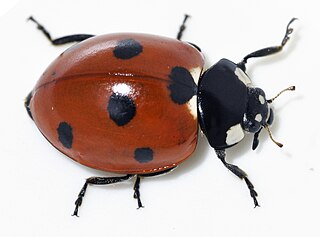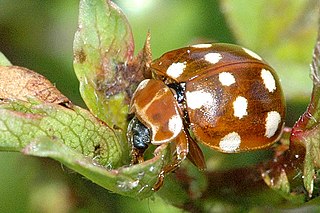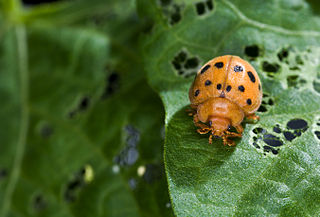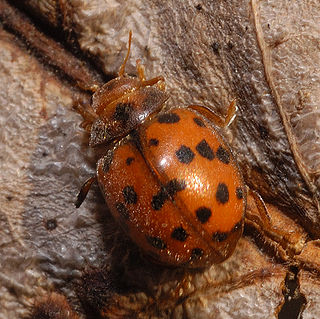
George Robert Crotch was a British entomologist and an authority on Coleoptera (beetles), particularly the ladybird beetles. He was the grandson of the English composer and organist William Crotch.

Coccinellidae is a widespread family of small beetles. They are commonly known as ladybugs in North America and ladybirds in the United Kingdom; "lady" refers to mother Mary. Entomologists use the names ladybird beetles or lady beetles to avoid confusion with true bugs. The more than 6,000 described species have a global distribution and are found in a variety of habitats. They are oval beetles with a domed back and flat underside. Many of the species have conspicuous aposematic (warning) colours and patterns, such as red with black spots, that warn potential predators that they taste bad.

Henosepilachna vigintioctopunctata is a species of beetle in the family Coccinellidae. It is commonly known as the 28-spotted potato ladybird or the Hadda beetle. It feeds on the foliage of potatoes and other solanaceous crops. It was previously called Epilachna vigintioctopunctata and is a cryptic species complex. It is very often confused with a closely related species, Henosepilachna vigintioctomaculata, which occurs in Russia, China, Japan, and Korea, and is given the same "common name".

Adalia decempunctata, the ten-spotted ladybird or ten-spotted lady beetle, is a carnivorous beetle of the family Coccinellidae.

Calvia quatuordecimguttata, the cream-spot ladybird, is a species of ladybird in the family Coccinellidae. Its distribution is holarctic, it being found in Europe and through the East Palearctic to Japan. It is introduced to North America. This ladybird is generally 4 to 5 millimetres in length and varies in appearance depending on the geographical location. It usually lives in hedgerows and deciduous trees.

Hippodamia variegata, the Adonis ladybird, also known as the variegated ladybug (US) and spotted amber ladybeetle (Aus), is a species of ladybeetle belonging to the family Coccinellidae, subfamily Coccinellinae.

The Epilachninae are a subfamily of the family of lady beetles, the Coccinellidae, in the order Coleoptera. Superficially, they look much like other ladybirds in the larger subfamily Coccinellinae, but they differ importantly in their biology, in that the members of the subfamily are largely or completely leaf-feeding herbivores rather than being predators. Accordingly, several members of the subfamily are crop pests, and sometimes cause locally serious crop losses.

Anatis ocellata, commonly known as the eyed ladybug, is a species of ladybug in the family Coccinellidae. It has black spots on a red background, with each spot surrounded by a yellowish halo. In one color variation, a specimen found in Scotland was reported having the spots fused to form longitudinal lines. Sometimes can also be found variation where black spots are absent.

Exochomus quadripustulatus, common name pine ladybird or pine lady beetle, is a species of beetle of the family Coccinellidae. The distribution range of E. quadripustulatus includes Europe, Northern Asia, and North America.

Coccinellinae is a subfamily of lady beetles in the family Coccinellidae. There are at least 20 genera and 90 described species in Coccinellinae.

Subcoccinella vigintiquatuorpunctata is a beetle in the family Coccinellidae. It is the only member of the genus Subcoccinella. It has the typical, almost semi-spherical, ladybird shape and is patterned with spots. However it differs from many of the well-known ladybirds in being neither smooth and shiny nor an eater of aphids: the wing-cases look velvety and it eats fungal moulds on plants.

Sticholotidini is a beetle tribe in the subfamily Sticholotidinae of the family Coccinellidae (ladybirds).

Myzia oblongoguttata, commonly known as the striped ladybird, is a species of beetle in family Coccinellidae. It is found in the Palearctic.

Olla v-nigrum is a species in the family Coccinellidae, in the suborder Polyphaga. The species is known generally as the ashy gray lady beetle. The distribution range of Olla v-nigrum includes Central America, North America, and Oceania. It is usually gray or pale tan with small black spots on its elytra and thorax. However, a variation can resemble Chilocorus orbus, another species of lady beetle. This form is black with two red spots on the wing covers and has white on the edge of the prothorax.

Exoplectra is a genus of lady beetles in the family Coccinellidae. There are about nine described species in Exoplectra.
Chazeauiana is a genus of beetle in the family Coccinellidae, formerly included within the genus Epilachna.

Propylea dissecta, is a species of lady beetle native to India, Sri Lanka, Bangladesh and Nepal.

Scymnus (Pullus) latemaculatus, is a species of lady beetle found in Pakistan, India, Bangladesh, Sri Lanka, Thailand, and Taiwan.

Serangium is a genus in the lady beetle family (Coccinellidae).

Adira is a genus of beetles in the family Coccinellidae. It was first described by Gordon & Almeida, 1986



















